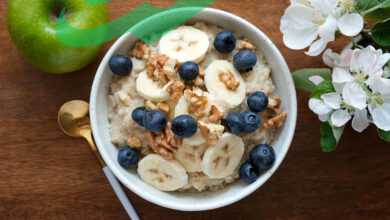Top 5 Canned Foods You Need for Survival
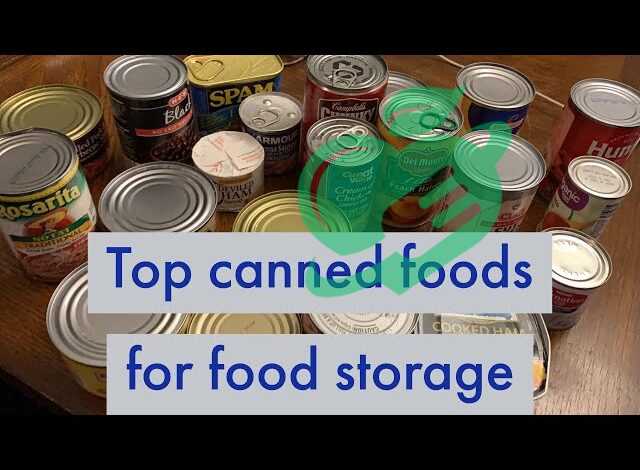
Significance of Canned Foods in Survival Situations
When it comes to survival situations, whether due to natural disasters, economic instability, or unexpected emergencies, having a reliable food source can make all the difference. Canned foods have emerged as a prized component of emergency preparedness due to their nutrient density, long shelf life, and ease of use. Imagine this: A severe storm knocks out power for days. Groceries run low, and fresh produce is no longer an option.
In such scenarios, canned foods stand out as saviors. They can sustain families, offering essential nutrition when fresh food isn’t available. Additionally, canned foods require no refrigeration, can be easily stored in your home, and are usually ready to eat after minimal preparation. The significance of canned foods in survival situations extends beyond just nourishment. They provide a sense of security.
Knowing that you have a stockpile of sustenance ready at hand can alleviate anxiety during uncertain times. Furthermore, canned foods often come in convenient packaging that is lightweight and easy to carry, making them ideal for emergency go-bags. For those beginning their survival food journey, here’s a quick overview of five of the top canned foods that not only store well but also pack a punch regarding nutrition:
- Canned Beans: Rich in protein and fiber, canned beans are incredibly versatile. They can be added to soups, salads, or eaten solo. Plus, they boast a long shelf life.
- Canned Vegetables: Offering essential vitamins and minerals, canned veggies can be a terrific addition to any dish. Their taste and texture may vary, but they are always a good option when fresh greens aren’t available.
- Canned Fish: Packed with omega-3 fatty acids and protein, canned fish like tuna and salmon are not only nutritious but also provide quick meal solutions. They can be eaten straight from the can or incorporated into a variety of meals.
- Canned Soups: A comforting option during chilly nights, canned soups are ready-to-eat meals that often come in various flavors. They provide hydration along with nutrition, making them perfect for survival situations.
- Canned Fruits: For a touch of sweetness, canned fruits can be a delightful treat. They also offer hydration and essential vitamins, and their natural sugars can provide the energy needed for survival situations.
These canned food options make excellent staples for anyone looking to prepare for potential emergencies. They serve not just as food but as vital sources of comfort during tough times.
Brief Overview of Top 5 Canned Foods for Survival
Understanding which canned foods to prioritize can significantly impact your preparedness strategy. Let’s break down the top five canned foods that should be staples in any survival kit:
- Canned Vegetables
- Nutritional Value: Rich in vitamins and minerals, providing vital nutrients in emergencies.
- Usage: Great as a side dish or incorporated into main meals.
- Canned Beans
- Nutritional Benefits: High in protein, fiber, and essential nutrients.
- Versatility: Can be used in salads, soups, or even as a stand-alone dish.
- Canned Fish
- Health Benefits: Offers a good source of omega-3 fatty acids and protein.
- Quick Meal Prep: Ideal for sandwiches or salads, allowing for flexible meal ideas.
- Canned Soups
- Convenience: Ready-to-eat meals that require minimal prep time.
- Comfort Food: A warm bowl can be incredibly comforting during stressful times.
- Canned Fruits
- Energy Boost: Provides natural sugars and hydration.
- Snack Option: Perfect for easy snacking or adding to meals for sweetness.
By integrating these canned foods into your emergency kit, you’ll not only ensure that you and your family have access to necessary calories but also a diversity of meals and nutrients during times of need. The importance of being prepared cannot be overstated; canned foods are an integral part of any survival strategy.
Read also: How to Make Hearty Barley Beef Soup at Home
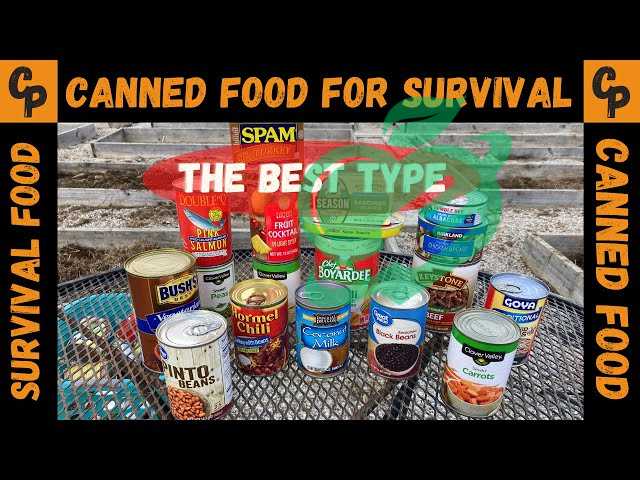
Benefits of Long Shelf Life for Survival Foods
When preparing for unforeseen circumstances—be it a natural disaster, a pandemic, or any situation where grocery shopping might become impossible—the importance of food longevity cannot be overstated.
Canned foods are particularly notable for their long shelf life, which provides numerous benefits that make them invaluable in survival situations. First and foremost, the extended shelf life of canned foods means that they can be stored for years without any significant degradation in quality.
This is crucial for those who want to ensure that they have access to safe and nutritious food when needed. Imagine having a few cans of hearty vegetable soup or savory chili tucked away in your pantry, ready to go whenever a storm hits. Moreover, a long shelf life allows for flexible meal planning. Meal prep takes on a new meaning when you don’t have to worry about food expiring prematurely. You can purchase a variety of canned goods, rotate your stock, and maintain a diverse pantry that extends beyond fresh ingredients that have a short lifespan. Another advantage is the potential to save money.
By investing in canned foods that last for years, you can take advantage of bulk buying or sales. This ensures that you have a reliable food source without frequently purchasing fresh items that might end up perishable. You get the peace of mind of knowing you’ve invested wisely, allowing you to focus on other aspects of preparedness. Finally, shelf-stable canned foods provide an asset during times of food scarcity.
For families who may have limited access to grocery stores, having a solid stockpile of long-lasting canned items can be a lifesaver. It alleviates anxiety around food security and helps individuals maintain their health, even when fresh options become limited.
Examples of Canned Foods with Extended Shelf Life
Now that we’ve established the importance of durability in canned food options, let’s dive into specific examples of canned foods known for their long shelf life:
- Canned Vegetables
- Shelf Life: 3 to 5 years when stored properly.
- Highlights: Broccoli, corn, and peas can add essential nutrients to your meals.
- Canned Fruits
- Shelf Life: 1 to 2 years, but often longer based on the sugar and preservatives used.
- Highlights: Pineapples, peaches, and pears are not just tasty—they also offer vitamins and hydration.
- Canned Soups and Stews
- Shelf Life: 2 to 5 years.
- Highlights: Many come with protein-rich ingredients like beans or meat, providing a heartier meal option.
- Canned Fish
- Shelf Life: 3 to 5 years.
- Highlights: Tuna, salmon, and sardines are protein-packed options for versatile dishes.
- Canned Beans
- Shelf Life: 2 to 5 years.
- Highlights: Different varieties, including black beans and kidney beans, are excellent sources of fiber and protein.
- Canned Tomato Products
- Shelf Life: 1 to 2 years, with tomato sauce often lasting longer.
- Highlights: Canned tomatoes can serve as a base for soups, sauces, and stews.
- Canned Pasta
- Shelf Life: 1 to 3 years.
- Highlights: Often ready to eat, servings like ravioli or spaghetti provide a comforting meal option.
- Canned Chili
- Shelf Life: 2 to 5 years.
- Highlights: A fulfilling option packed with protein and flavor, great for busy situations.
Incorporating a variety of these canned foods into your survival pantry creates an excellent foundation for meeting nutritional needs during emergencies.
Proper storage is essential to ensure these canned goods maintain their quality; ideal conditions include keeping them in a cool, dark place away from humidity.
By prioritizing canned foods with long shelf lives, individuals can strategically prepare for any situation while enjoying the benefit of having nutritious meals readily available. It’s a simple yet effective way to enhance overall preparedness and peace of mind.
Read also: Find the Best Tomato Sauce Equivalent for Your Recipes
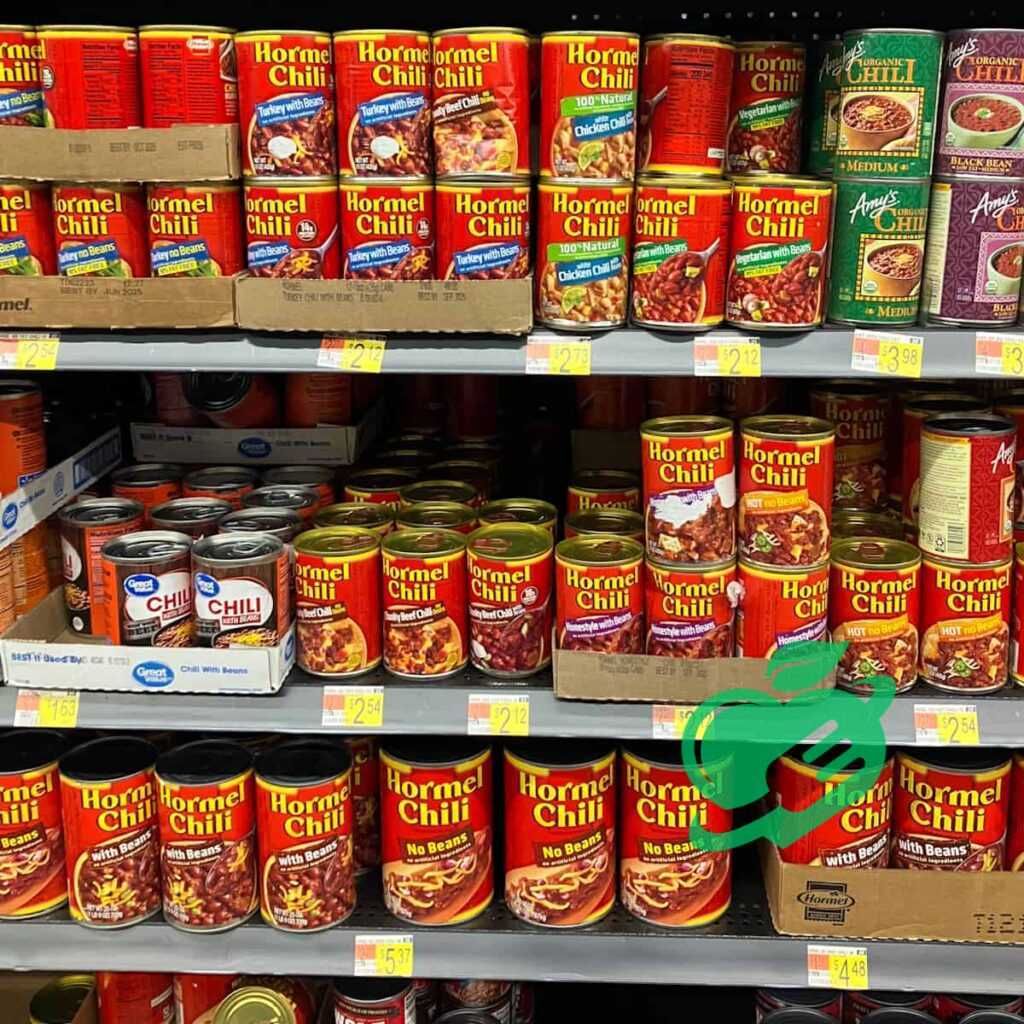
Importance of Nutrient Density in Survival Foods
In times of crisis, having enough food is one thing, but ensuring that food provides the necessary nutrients is another. This is where nutrient density comes into play. Nutrient-dense foods offer a significant amount of vitamins, minerals, and other beneficial compounds relative to their calorie content. In survival situations, this becomes crucial for maintaining energy levels, supporting immunity, and overall health.
Consider a scenario where you’re relying on your food provisions for an extended period. While empty calories might keep you feeling full momentarily, they can lead to fatigue, decreased cognitive function, and susceptibility to illness over time. On the contrary, when your meals are rich in nutrients, you’re more likely to maintain your strength and health. A well-balanced diet is key to resilience.
Nutrient-dense canned foods can provide proteins that help with muscle repair, fibers that aid digestion, and essential fats that promote brain health—all of which are vital when facing stressful situations. Moreover, during emergencies, access to fresh foods may be limited, leading to potential nutritional deficiencies.
By stocking up on nutrient-rich canned foods, you ensure that your body receives the necessary building blocks for your immune system, hormone production, and overall well-being. This focus on quality over sheer quantity is what sets a truly prepared individual apart; it’s not just about surviving but thriving in tough times.
Top Canned Foods Packed with Essential Nutrients
Now that we understand the significance of nutrient density in survival foods, let’s explore specific canned options that are not only shelf-stable but also nutritionally robust. Here’s a selection of nutrient-rich canned foods that can elevate any survival pantry:
- Canned Beans
- Nutritional Benefits: Packed with protein, fiber, and essential minerals like iron and magnesium.
- Usage Ideas: Add to salads, and soups, or use as a base for chili.
- Canned Fish (Tuna, Salmon)
- Nutritional Benefits: Rich in protein and omega-3 fatty acids, essential for heart and brain health.
- Usage Ideas: Perfect for sandwiches, salads, or pasta. A tuna salad can be made in minutes!
- Canned Spinach or Kale
- Nutritional Benefits: Contains vitamins A, C, and K, along with iron and calcium.
- Usage Ideas: Great for adding to soups or casseroles, and also a nice side dish when heated.
- Canned Tomatoes
- Nutritional Benefits: High in antioxidants like lycopene, which may benefit heart health and cancer prevention.
- Usage Ideas: Can be used in sauces, stews, or simply added to pasta dishes.
- Canned Sweet Potatoes
- Nutritional Benefits: Full of vitamins A and C, plus fiber and potassium, essential for immune function and heart health.
- Usage Ideas: Mash them or add them to soups for a nutrient boost.
- Canned Pumpkin
- Nutritional Benefits: Packed with vitamins A and C, fiber, and antioxidants. Good for digestion.
- Usage Ideas: These can be used in baked goods or blended into smoothies.
- Canned Sardines
- Nutritional Benefits: High in omega-3s, calcium, protein, and vitamin D.
- Usage Ideas: Great on whole-grain crackers or as a topping for salads.
- Canned Lentils
- Nutritional Benefits: Excellent source of plant-based protein, fiber, and B vitamins, making them great for energy.
- Usage Ideas: Add to soups, stews, or salads for a protein punch.
By incorporating these nutrient-rich canned foods into your emergency stockpile, you can ensure that you’re not just filling your stomach but also nourishing your body. Aim to create a diverse food supply that emphasizes nutritional variety, as this will support different bodily functions and help combat potential nutritional deficiencies.
While it’s essential to prepare for emergencies with ample food supplies, paying attention to nutrient density is what truly fosters resilience.
With these nutrient-packed canned options, individuals can feel confident that they’re setting themselves up for both immediate and long-term wellness in the face of adversity.
Read also: Choosing the Right Contraception: A Complete Overview
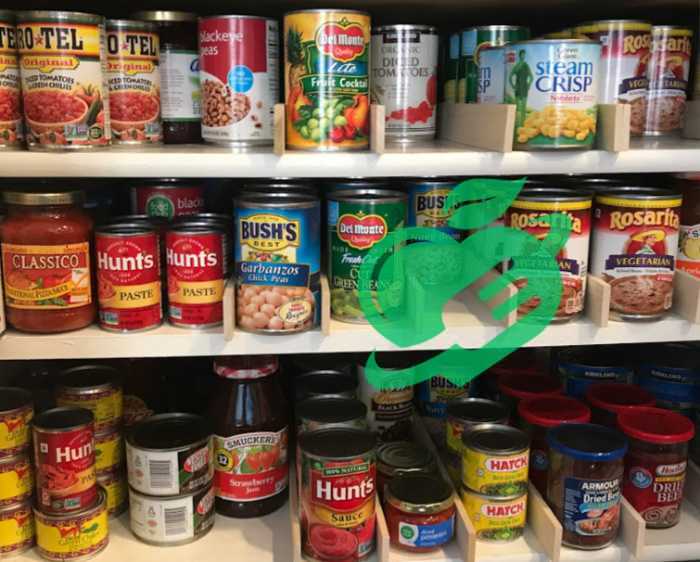
Ability to Create Various Meals from Canned Foods
As we continue exploring the array of benefits that canned foods provide, one significant advantage is their versatility in meal preparation. When faced with limited resources, the ability to create a variety of meals from a few simple canned ingredients can be a game changer. Picture this: A rainy weekend forces you to stay indoors, and the idea of venturing out for groceries feels daunting. In your pantry, you stumble upon canned goods that seem mundane at first glance. However, with a little creativity, they can transform into hearty meals. Canned foods lend themselves to endless combinations, allowing you to whip up everything from soups to main courses and even desserts. Let’s take canned beans, for example. They can serve as a base for different dishes:
- Chili: Mix with canned tomatoes, corn, and a blend of spices for a hearty chili.
- Salads: Toss canned beans with fresh veggies, olive oil, and a splash of vinegar for a quick salad.
- Tacos: Spice up canned beans with taco seasoning and serve them in tortillas with your favorite toppings.
Similarly, canned vegetables can enhance countless meals:
- Stir-Fries: Combine canned stir-fry vegetables with meat or tofu and your choice of sauce for a quick dinner.
- Casseroles: Mix canned veggies with pasta, protein, and cheese for a comforting casserole.
Moreover, canned fish provides a wealth of meal solutions:
- Fish Cakes: Blend canned tuna or salmon with breadcrumbs and spices to create flavorful fish cakes.
- Pasta: Pair canned fish with pasta, olive oil, and garlic for a quick and nutritious meal.
This flexibility allows families to incorporate what’s available while minimizing food waste and maximizing nourishment, making canned foods an essential part of any survival kit.
Read also: The Ultimate Guide to Boosting Your Health with Lima Beans.
Multi-Purpose Canned Foods for Diverse Dietary Needs
One of the significant aspects of canned foods is their ability to cater to diverse dietary needs. This inclusivity is key when you’re trying to accommodate everyone in your household. Whether someone follows a vegetarian, gluten-free, or low-carb diet, there are canned options available. Here’s a look at some multi-purpose canned foods that can easily fit into various dietary preferences:
- Canned Beans:
- Dietary Appeal: High in protein and fiber, making them perfect for vegetarians, vegans, and anyone seeking plant-based meals.
- Meal Ideas: Use in shakshuka, tacos, or burrito bowls.
- Canned Tomatoes:
- Dietary Appeal: Naturally gluten-free, low in calories, and rich in vitamins, they can be an essential part of countless dishes.
- Meal Ideas: From sauces to soups, the possibilities are endless.
- Canned Fish (Tuna, Salmon):
- Dietary Appeal: High in protein and healthy fats, they can suit those following a low-carb or paleo diet.
- Meal Ideas: Great for salads, casseroles, or simple sandwiches.
- Canned Vegetables:
- Dietary Appeal: Versatile and easy to incorporate into almost any diet, they’re low in calories and provide essential nutrients.
- Meal Ideas: Toss into stews or noodle dishes.
- Canned Fruits in Juice:
- Dietary Appeal: A healthy snack for those looking for a low-calorie sweet treat while being suitable for various diet plans.
- Meal Ideas: Use in smoothies or as a topping for yogurt.
Having a variety of canned foods on hand allows for easy meal customization, making it simple to accommodate everyone’s preferences and needs.
For families with children, introducing new ingredients into meals can be an exciting way to get them involved and teach valuable nutrition lessons. In conclusion, the versatility of canned foods makes them a smart choice for any pantry, especially in survival situations.
Not only do they provide a wealth of meal options from limited resources, but they also cater to diverse dietary preferences. By creatively utilizing what’s available, individuals and families can maintain a varied and healthy diet, even in challenging circumstances.
The next time you glance at your pantry, remember that those cans hold the potential for countless delicious meals waiting to be explored!
Read also: 6 types of food to beware of during the first three months of pregnancy.
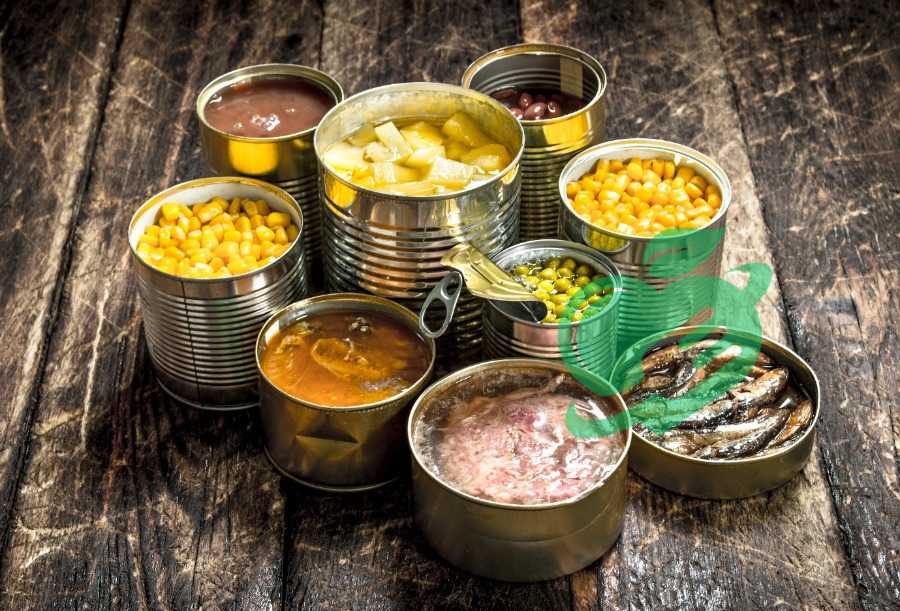
Ease of Preparation and Consumption in Emergency Situations
As we navigate the unpredictability of life, convenience becomes paramount, particularly during emergencies. Canned foods shine in these instances, offering unparalleled ease of preparation and consumption. Imagine you’re on the verge of a storm, and the electricity goes out. You’re faced with the immediate challenge of feeding your family under stressful conditions. This is where the true value of canned foods comes into play. No cooking is required; many canned foods can be enjoyed straight from the can. This instant gratification can make all the difference when time is of the essence. Here are a few advantages of canned foods during emergencies:
- Quick Access: If you have a stockpile of canned goods, simply grab a can and a spoon. Whether it’s tuna, beans, or soup, these foods can be consumed with minimal fuss.
- No Cooking Needed: In situations where you may lack cooking facilities, canned foods don’t require any preparation. You can even heat them on a camping stove if desired, but many options are perfectly delicious straight out of the can.
- Minimal Clean-Up: With no pots or pans to wash, all you need to do is recycle the can after eating, making clean-up a breeze.
- Longevity and Stability: Canned foods maintain their quality for years if stored properly. No need to worry about rapid spoilage or food waste.
Portable Canned Foods for On-the-Go Survival Needs
Not only are canned foods practical during home emergencies, but their portability also makes them ideal for on-the-go survival needs. Whether you’re hiking, camping, or simply traveling, having nutritious food readily available is essential. Here are some features that make canned foods exceptional companions for any adventure:
- Lightweight Packaging: Compared to bulkier packaged foods, canned items are relatively lightweight, allowing for easy transport.
- Resilience: Cans can withstand various conditions, whether they’re being tossed in a backpack or stored in a car. They’re less prone to damage compared to glass containers or soft packaging.
- Nutritional Value: Canned foods can deliver essential nutrients when fresh options aren’t viable during a trip. Tuck them into your pack to maintain energy levels.
- Variety of Options: From fruits and vegetables to protein-rich fish and meats, the range of portable canned foods means you won’t get bored with your meals on the road.
- No Refrigeration Required: Canned foods eliminate the need for ice packs or coolers, especially important during long hikes or extended outdoor trips.
Frequently asked questions
Is canned food healthy or not?
Canned foods can be equally nutritious as fresh and frozen options since the canning process helps retain many nutrients. The levels of minerals, fat-soluble vitamins, protein, fat, and carbohydrates usually remain fairly consistent during canning. 1
What is the canning of food?
Canning is the method of sealing foods in jars or cans and heating them to a specific temperature, which helps preserve a variety of foods. The elevated temperature eliminates microorganisms and deactivates enzymes, ensuring the food remains safe and of good quality. 2
Is canning food safe?
Home canning is a great method for preserving garden harvests and sharing them with loved ones. However, it can pose significant risks—including potentially fatal ones—if not performed properly and safely. In the United States, home-canned vegetables are the leading cause of botulism outbreaks. 3
How is canned food made?
The canning procedure involves multiple steps: cleaning and preparing the raw ingredients, blanching them, filling the containers—typically under a vacuum—sealing the containers, sterilizing the canned items, and finally labeling and storing the finished products. 4
What are the 3 methods of canning?
The canning process involves multiple steps: cleaning and preparing the raw food ingredients, blanching them, filling the containers—often in a vacuum—sealing them, sterilizing the canned items, and finally labeling and storing the finished products. 5
can you bring food through TSA?
Solid foods (as opposed to liquids or gels) are allowed in both carry-on and checked luggage. TSA officials may ask travelers to take out certain items from their carry-on bags, including food, powders, and any substances that could create clutter and hinder clear images on the X-ray scanner. 6
how long can a person live without food?
While someone can go 30 days without food, it is quite rare. Some reports indicate that individuals have survived for up to 61 days, but generally, most people can last between 8 to 21 days. 7
Your body is a mirror of what you eat, so make your food your source of strength and health. Choose with love and awareness what nourishes your body and soul, and be a friend of nature and its colors on your plate, because proper nutrition is the key to a life full of energy and wellness. Follow us constantly, as we strive to provide more useful articles and reliable information that make a difference in your daily life and help you achieve your health goals.
- Reference
- eat right ((↩))
- extension ((↩))
- foodsafety ((↩))
- britannica((↩))
- extension ((↩))
- tsa ((↩))
- healthline ((↩))

